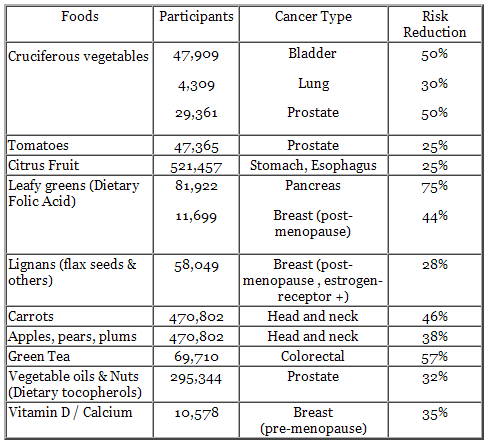We've known for many years that consuming copious amounts of certain specific fruits and vegetables reduces our risk of developing various types of cancer. But a recent study reminds us that this protective effect is not linked to all fruit and vegetables. Some foods contain larger amounts of anticancer molecules. Thus we need to be attentive to our choices.
Lifestyle and Cancer:
Cancer is not a disease whose origin is principally genetic, as many people continue to believe. It is a pathology that is closely linked to a range of lifestyle factors, particularly smoking and obesity (which stems from our sedentary habits and our dietary choices). Several studies have shown a direct link between the regular consumption of certain fruits and vegetables and a reduction in risk of developing various types of cancer.
Protective studies showing links between consumption of specific foods and the incidence of cancer in human populations: 
Source: Beliveau, Gingras, Blaslyk, Eating Well, Living Well: An Everyday Guide for Optimum Health
It's particularly important to specifically include these in our diet, because not all fruits and vegetables share the same potential for active prevention against cancer. There are major differences in their levels of anticancer components. In some cases the phytochemical components that provide the greatest cancer-preventing activity are present only in a few, very specific fruits and vegetables. For example, the isoflavones of soy, the resveratrol of grapes, the curcumin of turmeric, the isothiocyanates and indoles of broccoli and the catechins of green tea are all anticancer molecules whose distribution among plants is extremely restricted.
In other words, even though all fruits and vegetables are an integral part of a balanced diet, only some of them can truly influence the risk of cancer.
Quality, Not Quantity
The importance of including these foods in our diet is fully illustrated by results of studies that examine the global risk of cancer according to the total quantity of fruit and vegetables consumed, without regard for specific types. For example, a study of more than 100,000 American health professions did not establish that total consumption of fruit and vegetables was linked to a reduction in the risk of cancer (1). However, within this same population researchers have observed a significant reduction in the risk of bladder cancer in men who consumed large amounts of cruciferous vegetables (2), and a significant reduction in the risk of prostate cancer following regular consumption of tomato-based products (3). A European study of 400,000 people has just produced similar results. Total consumption of fruit and vegetables is not associated with a significant reduction in the total risk of cancer (4). However, results previously obtained from this same population show that certain fruits (particularly citrus fruit) considerably reduce the risk of stomach cancer (5).
These observations indicate that the development of various types of cancer is modulated differently by the specifics of the fruits and vegetables consumed, rather than by the quantity of overall consumption. This is very important, because in the United States fully half the fruit and vegetables consumed are relatively poor in protective impact (potatoes, iceberg lettuce, canned tomatoes), while the per capita consumption of plants rich in anticancer molecules -- such as cruciferous vegetables -- is barely 1 %. Increased consumption of foods that contain high amounts of anticancer molecules (cabbage family, garlic family, green tea, small fruit, citrus fruit, tomatoes and carrots), and which are thus able to target several distinct processes essential to the growth of cancer cells, is absolutely essential in order to reduce significantly the risk of certain cancers.
All fruits and vegetables are excellent for overall health. They protect, for example, against cardio-vascular disease. But in the case of cancer, we continue to emphasize that their protective effects are specific to certain fruits and vegetables.
Richard Beliveau Ph.D. and David Servan-Schreiber, M.D., Ph.D
Dr. David Servan-Schreiber wrote the best-selling Anticancer, A New Way of Life.
He regularly posts Anticancer research & insight on his Facebook Page & Twitter Account
Visit Anticancerbook.com for the complete Anticancer Lifestyle Guide
Richard Beliveau Ph.D. wrote Foods to Fight Cancer: Essential foods to help prevent cancer
Sources:
(1) Hung HC et al. Fruit and vegetable intake and risk of major chronic disease. J Natl Cancer Inst. 2004; 96:1577-84.
(2) Michaud DS, Spiegelman D, Clinton SK, Rimm EB, Willett WC, Giovannucci EL. Fruit and vegetable intake and incidence of bladder cancer in a male prospective cohort. J Natl Cancer Inst. 1999 ; 91: 605-613.
(3) Giovannucci E et al. A prospective study of tomato products, lycopene, and prostate cancer risk. J Natl Cancer Inst. 2002 ; 94: 391-398.
(4) Boffetta et al. Fruit and vegetable intake and overall cancer risk in the European Prospective Investigation into Cancer and nutrition (EPIC). J Natl Cancer Inst. 2010; 102:1-9
(5) Gonzalez CA et al. Fruit and vegetable intake and the risk of stomach and oesophagus adenocarcinoma in the European Prospective Investigation into Cancer and Nutrition (EPIC-EURGAST). Int J Cancer. 2006; 118: 2559-66